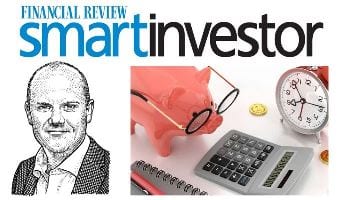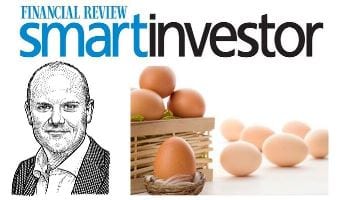Note: We share this thought piece with clients and friends of Quantum Financial. Quantum Financial is an award winning practice at the forefront of Australian financial planning.
Cast your mind back 12 years to 2002.
Globally, the Euro came into physical existence; East Timor became a country; the Queen Mum died, WorldCom filed for the largest ever Chapter 11 bankruptcy; and Brazil won the World Cup in Japan.
In Australia Ansett ceased flying; the ABC had a surprise new hit with Kath and Kim; we suffered from the worst drought in 100 years and Steven Bradbury fell across the finishing line to win gold in Salt Lake City.
In the IT world, Sanyo’s SCP-5300 model was the first mobile phone to incorporate a camera – it was low quality but it was the first. In Canada a firm named Research in Motion launched its first Blackberry mobile phone.
March 2002 marked the first time the term Robo-advisor was ever used.
Richard J. Koreto penned a visionary article in Financial Planning Magazine with a title that’s a mouthful:
“Robo-advisor: In a new world of intense 401(k) anxiety brought about by the Enron fiasco, the only hand investors may have to hold may be digital.”
Within his article he posed the question “Are these virtual advisers our allies, our partners — or our rivals?” – a question we are still debating today.
Rise of fool-proof technology?
Now cast your mind back to “2001”.
“No 9000 computer has ever made a mistake or distorted information. We are all, by any practical definition of the words, foolproof and incapable of error.” (HAL)
Science fiction fans may recognise the quote above from the Stanley Kubrick movie, 2001 A Space Odyssey. Due to a conflict in its programming, the computer HAL went mad and embarked on a killing rampage to eradicate the astronauts on his spacecraft.
Right now you may be asking yourself ‘Is Robo-advice something to be feared? ‘Is it something to be excited about?’ ‘Is it just a storm in a tea-cup?’
Let’s start with the name.
‘Robo-advice’ implies many things and frankly most of them are bad. It implies a soulless, unthinking and inflexible technology with the potential to oppress us. It’s not human and it doesn’t sound welcoming. How happy are you when you receive a robocall? Not quite ready to replace your pet dog or your fish with a robodog or a robofish?
What is Robo-advice
Robo-advice is defined by Investopedia as “an online wealth management service that provides automated, algorithm-based portfolio management advice without the use of human financial planners”.
In plain English, it is an online site that provides a degree of personalised advice and recommends appropriate investments at a reasonable price, to a large number of people who aren’t necessarily wealthy. It will provide you with an investment portfolio less expensively than flesh-and-blood investment advisors.
So Robo-advice is not something to be feared (unless you happen to be a large financial institution or an advisor providing your clients with a poor service).
Disrupt or be disrupted
“Over the next 10 years, I expect many more industries to be disrupted by software, with new world-beating Silicon Valley companies doing the disruption in more cases than not.” (Marc Andreessen, co-founder of Netscape; early investor in start-ups including Twitter, Facebook, Skype & Pinterest)
Markets, such as betting, music, retail, media and aviation, have been disrupted by Sportsbet, Napster, Amazon, Google and budget airlines years ago. Today the taxi industry faces multiple disruptors such as Uber and goCatch while hotels are challenged by Airbnb. To date, financial services has successfully weathered the approaching disruptive storm.
However, more and more young, bright, social disruptors (not from a financial background) are dedicating themselves to disrupting financial service’s juicy profit margins.
Use of mobile and other online devices is surging: 83% of adults go online; 98% of 16-35’s are online; and 42% of those over 65 are online (source: Ofcom). 6 in 10 of us now have a smartphone.
If you combine the rapid advancement of technology; globalisation; jaded investors still smarting from the Global Financial Crisis; and record low trust in financial institutions; you have just the right environment for a perfect storm.
In a sobering prediction for the finance industry, Deloitte claims that “of all Australian industries the finance industry is expected to experience the most significant digital disruption in the short term, with a potential 45% change in business metrics within five years.”
In this perfect storm small players will lead
Right now the movement in the Australian Robo-advice space lags the rest of the world, which is not to say smart technology is not already touching nearly every part of your financial life.
Share trading that used to take place on the floor of physical stock exchanges transacted through your broker now occurs real time through a cheap online broker. There’s many websites for that. You don’t go into bank branches any more – ATMs and EFTPOS devices are everywhere. Online banking is a given and, what’s more, everyone now has one app or more on their phone or tablet for that.
There already exists a fairly clunky and very expensive IT service that allows investors to consolidate their investments and superannuation. In recent decades the banks have spent hundreds of millions of dollars on these proprietary and closed IT systems known as platforms or wraps. They employ an army of tied advisors to feed these expensive IT systems with their own products to maximise their profits. They’re not about to give up on this significant investment any time soon.
If you want to know where Australia is heading, the US and the challenge on Wall Street from Silicon Valley is a great place to start.
The US is experiencing the first wave of Robo-advisors – let’s call them Robo-advisors 1.0. These are low cost websites that provide investors with commission free advice that you can cancel any time. They are run by young IT entrepreneurs not tainted with any ties to the banks and who hold few finance qualifications between them (they hire people like that).
They provide:
- Personalised portfolio allocation (taking into account all of your investments and your family’s situation)
- Tax aware portfolio design (to reduce the tax you pay)
- Tax loss harvesting (effective use of any tax losses to further reduce taxes)
- Smart rebalancing (typically quarterly)
- 24/7 access and control
- Low fees are the immediate benefit to consumers. The fees for a Robo-advisor service typically are between 0.15% to 0.5% of your assets. One charges a fixed fee $149.95 pa irrespective of your assets (Financial Guard). Another is free for investments under $25,000 then scales fees up with your portfolio size (Jemstep). This compares favourably to traditional advice that costs ~1.0% plus a wrap fee of 0.4% to 0.8% plus a product fee of 0.4% to 1.5%.
Who’s who in the zoo?
There are a large number of well-funded start-ups entering the Robo-advice space (and none ever mention the term Robo-advisor!). They include:
- FutureAdviser “Premium investment management for everyone”
- Betterment “Investing made better through smarter technology”
- Wealthfront “Clients trust Wealthfront to manage over $1 billion of their assets.”
- Financial Guard “Financial Guard will advise you. Investing for retirement made easy”
- SigFig “Our customers use SigFig to manage over $300 billion. The easiest way to manage your money”
- Jemstep “A better way to manage your retirement savings”
- Nutmeg (UK) “Get an intelligent, fully-managed investment portfolio. All for the cost of doing it yourself”
But large players will buy them
We believe the finance industry will follow the lead of the airlines and try to run a dual-operating structure. Much like Qantas with its Jetstar brand; financial institutions will attempt to execute on their current strategy as well as try to control the disruption in a separate entity. Whether they can successfully execute on this is questionable.
In the US we’re seeing the first moves in this direction as Fidelity teams up with Betterment while Charles Schwab and Vanguard seek to launch their own Robo-advisor equivalent service.
We don’t think financial institutions have the knowledge, skills or ability to develop this disruption themselves. They will either seek to partner with disruptors or buy them out.
It will be good for consumers
All of this is good news for consumers. For those who can’t currently afford or don’t trust advice, this will provide them with a low cost service. For those who receive advice it will put competitive pressure on fees and services you receive.
We see Robo-advisors as the next step in the true democratisation of finance. They build on historical steps such as the first joint stock company, the first mutual fund, the first index fund and the first Exchange Traded Fund with each opening investing up to more and more people.
The finance industry is a Blackberry & change is coming
For many in the finance industry will be seriously challenged by these changes. They should be afraid, very afraid. Demographics and rapid IT evolution will not be their friend while barriers to entry will be lowered. There will be a market for Robo-advice and it will be a big one.
For banks and advisors who’ve built their business model servicing them entirely on a proprietary platform, they have the equivalent of a Nokia or a Blackberry in a world where the equivalents to iPhone, Android and Samsung phones are all coming. That Nokia or Blackberry infrastructure will continue working for a fair amount of time but the world will rapidly change around them. We all know what happened to Nokia & Blackberry.
It’s only just begun
As discussed above the first incremental change is Robo-advisors 1.0 where the focus is saving on fees, transparency scalability. Effectively these services just do what the back office of a traditional wrap or advice practice do, but much better and cheaper.
The second and potentially even more disruptive wave will be Robo-advisors 2.0 which will likely incorporate the improvements from Big Data and AI (Artificial Intelligence). This change won’t happen overnight but as it evolves it will be huge. If the software of today can now beat a grand master at chess, the software of the future will be able to provide holistic financial planning across a range of services.
Consumers be excited – Robo-advisors are coming.




